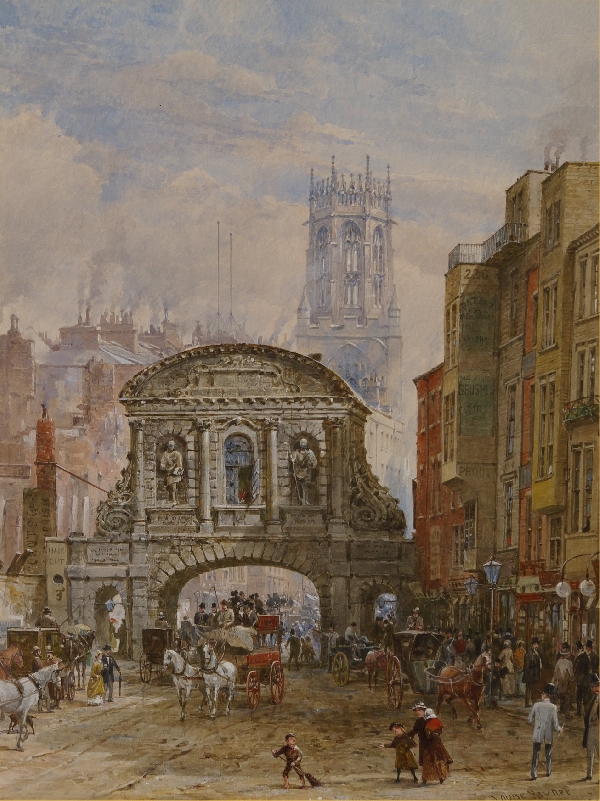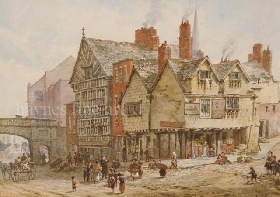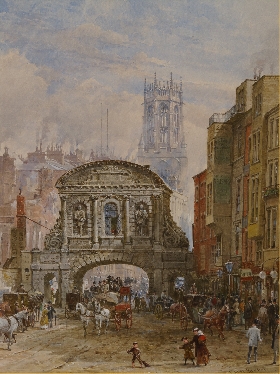Artists Biography
Louise J. Rayner
British 1829 - 1924
At the age of fifteen Louise began to study painting seriously, at first with her father and later under guidance from artist friends such as George Cattermole (1800-1868), Edmund Niemann (1813-1876), David Roberts (1796-1864) and Frank Stone (1800-1859). Roberts, the best known of the four, was a Scottish artist who specialised in architectural and topographical scenes. He trained as a stage scenery painter before travelling through France and Spain, where he made dramatic and evocative pictures of churches, ruins and cities. From 1838 he travelled throughout the Middle East recording the Holy Land. His influence can be seen in Louise Rayner's later works. Her first exhibit at the Royal Academy in 1852 was an oil painting of "The Interior of Haddon Chapel, Derbyshire".
Louise Rayner, like Roberts, depicted cities and ruins as well as stately homes and their surroundings. Louise is first recorded as being in Chester in 1869, by which point she had reached her mature style. Her paintings from this period are very detailed and highly picturesque, capturing the "olde worlde" character of Chester and other cities. She often filled her most finished works with figures going about their daily tasks, including street sellers and purchasers. Louise travelled extensively throughout Britain each summer during the 1870s and 1880s, and also visited northern France. Her watercolours include scenes of Edinburgh, Shrewsbury, Gloucester, York, London, Coventry, Windsor and Salisbury.
Louise Rayner lived at 2 Ash Grove, off the Wrexham Road, in Chester. She was a boarder with Robert Shearing (who owned a chemist's shop in Watergate Street) and his wife Mary Anne. In the 1890s her sister Margaret came to lodge with her at Chester, where they taught watercolour drawing. They moved to Tunbridge Wells about 1910, and Louise sold her last drawing in 1918 at the age of 86. After Margaret's death in 1920 Louise moved to Southwater Road, St Leonards-on-Sea, near Hastings, where she died on 8 October 1924. For nearly fifty years she had been a regular contributor to most of the major exhibitions in London, including the Royal Academy, the Royal Watercolour Society, the Royal Institute of Painters in Watercolours, the Royal Society of British Artists, the Society of Lady Artists and the Dudley Gallery.
Outside London she exhibited in Birmingham, Dublin, Liverpool and Manchester.
The Grosvenor Museum possesses twenty-three of Louise Rayner's watercolours, the largest number in any public collection. There is a lovely story that Louise Rayner used to visit the Museum in the early 1900s. Most depict scenes of Chester streets and individual buildings. Her compositions are highly popular with the public, and they are certainly very charming. Louise Rayner was a very able draughtsperson. Some of her views of Chester, such as Harvie's Almshouses in Duke Street, provide our only images of these buildings. However, she did use artistic licence to move buildings and alter the perspective to make better images.
Her earlier works are generally thought to be her best, as her later works are less spontaneous and slightly repetitive. It is not surprising that once she found a ready market she continued to supply the demand for similar work. Among her earliest works are a small number of oil paintings, but she soon changed to working almost exclusively in watercolour.




